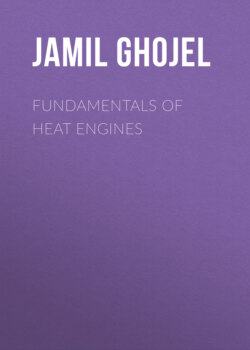Читать книгу Fundamentals of Heat Engines - Jamil Ghojel - Страница 58
1.3.6 Second Law of Thermodynamics
ОглавлениеThe first law of thermodynamics states that energy cannot be created or destroyed but it can be converted from one form to another; and when heat is converted to work, the latter can never be greater than the former. However, it does not state how much of the heat energy, for example, can be converted to work and how efficiently. The second law, in its various statements, gives the answers to these questions. A clear statement of the second law (Rogers and Mayhew, 1992) that is relevant to the subject matter of this book and based on Planck's statement is as follows:
“It is impossible to construct a system which will operate as a cycle, extract heat from a reservoir and do an equivalent amount of work on the surroundings.”
It follows that part of the extracted heat must be rejected to another reservoir at a lower temperature. Two cases can be identified:
Heat transfer will occur down a temperature gradient as heat from high‐temperature source, such as combustion chamber in a gas turbine, is partly converted to mechanical work with the balance rejected to a low‐temperature reservoir (sink) such as the atmosphere (Figure 1.15a). This system is known as a heat engine.
Heat can be transferred from a low‐temperature source, such as the cooling compartment in a refrigerator, up a temperature gradient to a high‐temperature reservoir (sink), such as the kitchen, with the assistance of external mechanical work (Figure 1.15b). This system is known as a heat pump, air conditioner, or refrigerator.
Figure 1.15 Schematic arrangements of a (a) heat engine; (b) heat pump or refrigerator.
The second law of thermodynamics is also stated as the law of degradation of energy whereby the quantity of energy is conserved, but its quality (the potential to produce useful work) is not. Every time energy changes form or is transferred from one system to another, its potential to produce useful work is reduced irreversibly forever. It is then said that energy has degraded.
This law is the reason we may face an energy and/or climate crisis. All the energy that we use ultimately ends up as waste heat transferred to the earth's atmosphere and then to space.
